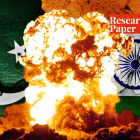Mr Abdullah Mian is an undergraduate student pursuing Physics at LUMS. He hopes to improve the quality of Pakistan's education system and advocate for rational education over an emotional one.
Immutable Wars
War excites us. It is in our nature to kill, plunder, and destroy. Often accompanied by genocide, it has rarely been morally justifiable. It has devastated entire cities and shattered empires. As things are, war will continue to dominate most of our future history. However, if we play our cards right, we might be able to limit the scale of the damage.
As outspoken scientists and philosophers continue to remind us, we must eventually mature as a species, cast off the chains that bind us to the earth, and look to the heavens. Carl Sagan once said that “the sky calls to us. If we do not destroy ourselves, we will one day venture to the stars.” We must venture into outer space and establish our civilization on other planets, around other suns, and, perhaps, in other galaxies.
This will only come to pass if we succeed in breaking free from the chains that currently ground us. One of these chains—perhaps the thickest—is mutual mistrust, which is one of the most unpleasant traits passed down to us by our hominid ancestors. A few million years ago, the hominids dwelt atop trees in the dense forests of Africa. Only the most territorial and hostile groups survived by eliminating competition and claiming food-rich areas for themselves.
Hence, the mistrust of foreign elements was hardwired into us via natural selection. In the past ten thousand or so years, this genetically driven mistrust—which often led to war—did not threaten our own survival (as a species). I will be referring to this as “safe warfare”, which can be defined as war without the usage of weapons of mass destruction.
Recorded History
The oldest recorded large scale war took place in Mesopotamia around 2700BCE. However, a number of sites have been unearthed which bear evidence of massacres and extreme violence as long as 14,000 years ago such as the Jebel Sahaba graveyard. In the Dark Ages and the Middle-Ages, war was commonplace. Most major wars were recorded in detail by historians, albeit with a bias towards the winning sides.
From small-scale wars to major conflicts between empires, we have records of most thanks to medieval historians. The largest of wars impacted no more than a few hundred thousand and the casualties were even less. The goal of most wars was to establish dominion, not to wipe out opponents, but our ability to inflict mass destruction has increased exponentially since then, especially in the last 60-70 years.
What does this imply for future large scale wars? It implies that the next may very well be the last war for humanity or, in the worst-case scenario, the last to be fought on Earth. Nuclear weapons would wreak unimaginable havoc and cause lasting damage to Earth’s habitability. Keeping in view of the implications of any future nuclear wars, it would be wise to begin taking precautions to avoid them and promote co-operation among humanity.
India and Pakistan: A Possible Nuclear War
A number of organizations have begun campaigning against the use of nuclear weapons; even Russia and the United States have dismantled a significant number of weapons. However, this is not enough to make a difference. For some states, nukes seem to serve as a deterrent to conflict-seeking opponents. The most notable examples are India and Pakistan.
Both countries shifted to waging war via media, which arguably causes more harm than conventional warfare; it cultivates an entire generation of irate civilians, absolutely oblivious of the actual implications of war. The subcontinent has been at war with itself for the past 70 years, both actively and passively.
There is no shortage of justifications for war from both sides: territorial disputes, religious differences, concerns for national sovereignty, and the list goes on. As a result, both sides have been obstinately preparing for war and expanding their military might. In 1974, India achieved nuclear power, placing Pakistan in a precarious position. Thus began the nuclear arms race of the subcontinent, and the rest is history.
Both countries have collectively amassed approximately 300 nuclear weapons in the 46 years since. If even a few were to detonate, they would dwarf the explosive magnitude of all the bombs detonated in WW1 and WW2 combined. Apart from Pakistan’s terrific nuclear collection, it also has an assortment of “conventional” weaponry ranging from tanks, aircraft and anti-aircraft guns to submarines, warships, and impeccable missile systems.
The Reality of STEM Education in Pakistan
Pakistan has unfortunately not been able to prioritize education as much as it should – given the lack of resources at the government’s disposal. Unemployment remains high, and inflation higher still. The living standards of the average citizen are subpar, and the education system needs quite a bit of improvement. Science is often misunderstood.
We seldom produce brilliant scientists, and when we do, they are at times ignored for their “western” ideals, which allegedly have no place in this utopia. Extremism still prevails in some areas, and the justice system is largely overburdened. The increasing population is only adding to the current issues.
Fortunately, all is not lost yet. Although we cannot be saved instantaneously by a new or inspirational leader who will snap his fingers and make all our problems disappear, we can save ourselves. It will be a tedious and lengthy process to which we must devote ourselves in order to give the next generation some hope. We cannot afford to be selfish. We must begin by reshaping our education system.
Reforming STEM Education
Presently, a large number of our educational institutes use memorization as the sole measure of intellect. In many such institutes, anyone who displays a questioning approach may be reprimanded and can even be called disrespectful. As a result of this, we produce a large number of hardworking, yet uninspired doctors, engineers, and teachers.
Reshaping our education system would require a complete revision or replacement of the current curriculum, introduction of practical teaching strategies, and nurturing a questioning environment in educational institutes. A country filled with educated and rational citizens would solve many seemingly unconquerable problems of today, but it is not a mission that can be achieved in a single generation.
It is for this reason that we must put aside our own selfish desires and dedicate ourselves to secure a prosperous future for our successors. As we consider our shortcomings, both educational and technological, we will inevitably come to the conclusion that we have thoroughly neglected science throughout our history.
We must then ask ourselves: how much has this cost us? The answer is that we are behind the rest of the world in most sciences. We have contributed almost nothing to the scientific world in recent times.
Significance of STEM Education
Despite science presiding over much of modern life, the average Pakistani does not have significant knowledge of the same. Our education system barely communicates the basics of science to those who are literate, and because of the strict teaching methods – students may not look back to science lessons in college fondly. Teachers in most public schools teach science as something to be memorized, not understood.
If science is taught correctly, we would raise a generation of skeptics who would never be content, and who would continue to improve and learn. That is what other nations have done, and it is the reason they are advancing so rapidly. As Carl Sagan famously said, “Science is more than a body of knowledge, it’s a way of thinking.”
Adopting the scientific method in every sphere of life would enable us to improve without an upper limit, to never be content. The very essence of science and invention lies in the principle of always remaining in pursuit of a deeper understanding and a better life. Once humans become content with what they have, the desire to improve and innovate disappears from within them.
The Future Is STEM
Science has unlocked the secrets of the universe and laid them bare to us. We use these developments in our technology, our medicines, and even our politics. There was a time when many children died at birth, and polio was unpreventable. In the 17th century, the average life expectancy was 35 years.
Why is it that today the life expectancy is soaring, and polio is eradicated? Modern medicine. Why do we have modern medicine? Science. Through science, mankind has reached the moon and even launched a probe beyond the solar system into interstellar space. The future belongs to the most technologically and scientifically advanced nations.
The world has reached the stars, and yet we are still grounded in age-old rivalries. The race to scientific supremacy and space travel has already begun, and we haven’t even left the starting line. If we are to be true patriots, we must recognize our flaws and work tirelessly to overcome them. It is time to recognize that the playing field has changed and that we must change with it.
If you want to submit your articles and/or research papers, please check the Submissions page.
The views and opinions expressed in this article/paper are the author’s own and do not necessarily reflect the editorial position of Paradigm Shift.



















